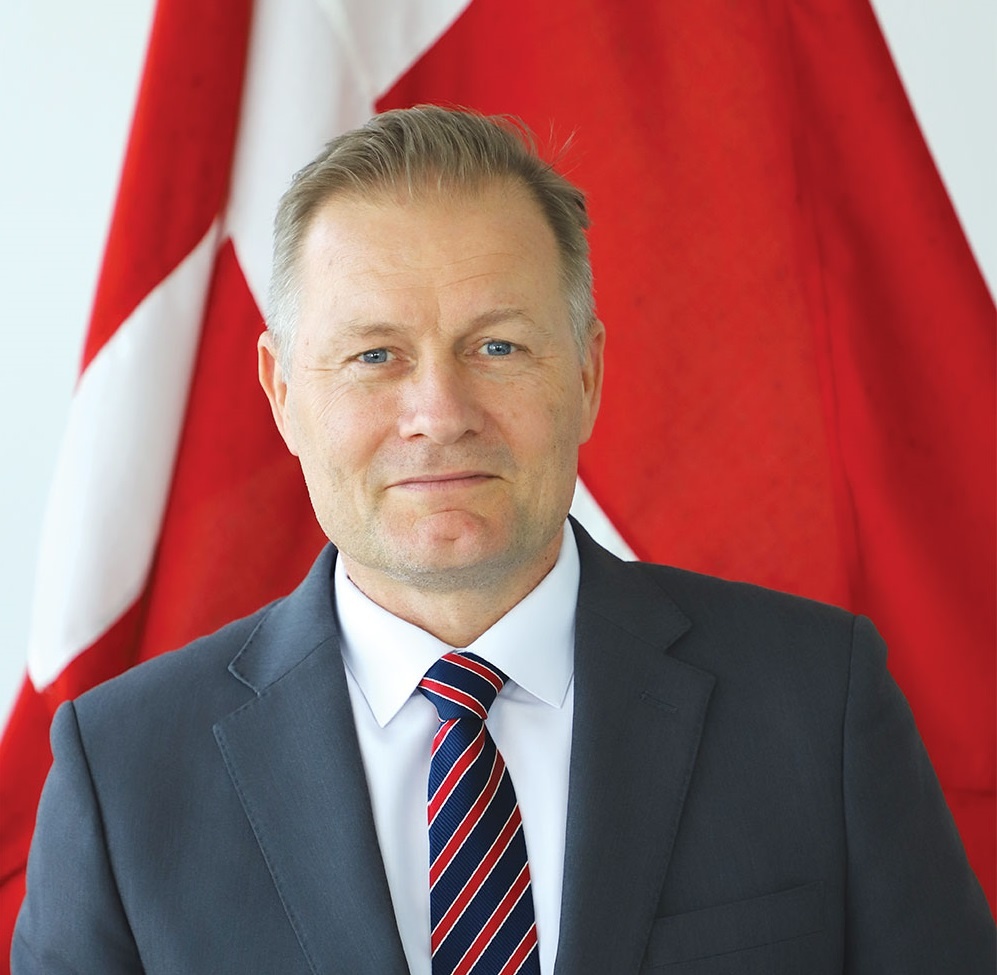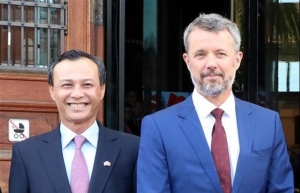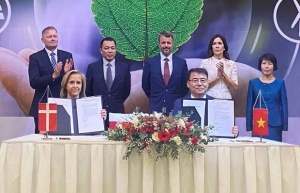Vietnam in 2023 - time to take off
What is your stance on the general status of Vietnam’s development?
 |
| Nicolai Prytz, Danish Ambassador to Vietnam |
Vietnam’s economy has rebounded swiftly after pandemic restrictions were eased over a year ago. The government also issued supportive policies such as low interest rates, strong credit growth, and an economic recovery and development programme, all of which have helped recover production and business activities. The lifting of mobility restrictions had also brought about a recovery in retail and a rebound in tourism, even though there is still some way to go.
In fact, Vietnam has recently attracted increasing foreign investment, thanks to international companies, in part due to their wish to diversify production facilities. However, looking ahead, Vietnam’s recovery is facing heightened uncertainties from the challenging global environment including, among other things, the risk of economic recession in developed countries, the prolonged war in Ukraine, and supply chain disruptions. Within the country, there are signs that the post-pandemic consumption rebound appears to be losing steam, while tighter financial conditions and rising inflation could further weaken domestic demand.
Vietnam therefore needs to strengthen its economic resilience and growth potential by deepening structural reforms, improving the business environment, increasing the quality of the labour force, and promoting investment in green technologies and products to enhance competitiveness and sustainability.
What achievements have been made in investment and trade between Vietnam and Denmark in 2022, which marked half a century of diplomatic relations?
Today, we have more than 135 Danish companies with a legal setup in Vietnam. Many big Danish groups have established a strong base and long-term business cooperation with Vietnam. Regarding investment, Vietnam is no doubt attracting the attention of Danish investors, not least thanks to the government’s strong commitment to reducing carbon emissions and actively responding to climate change. Denmark is now one of the biggest European investors in Vietnam. One of the recent highlights of Danish investment in Vietnam, for example, is Lego Group’s investment of over $1 billion in a new carbon-neutral production plant in Binh Duong province.
Currently, a number of other Danish companies are also looking to Vietnam as a potential investment destination. For instance, the two big players in the offshore wind industry, Copenhagen Infrastructure Partners and Ørsted, both have a pipeline of projects in Vietnam valued at billions of US dollars. Once they are completed, they are expected to power millions of local households and at the same time help Vietnam avoid millions of tonnes of CO2 emissions.
I also believe that in light of recent developments in the world’s economy and Vietnam’s potential of becoming a more strategic player in the global market, there will be more Danish investors and businesses with global solutions and technology looking for opportunities to strengthen their value chains here.
Besides traditional sectors like manufacturing of textiles, furniture, food, and agriculture, we have reasons to believe that companies in other areas such as technology, medical devices, and maritime will also consider Vietnam as an interesting landing place.
What were the most important milestones of trade-investment cooperation between the two countries in 2022?
One of the most important milestones in such cooperation in 2022 was the visit of the Crown Prince and Princess of Denmark to Vietnam in November. Accompanying the royal couple were 35 Danish companies with cutting-edge technology and know-how on sustainability and green transition, who came to Vietnam to look for cooperation opportunities and to strengthen business ties with potential Vietnamese partners. During this visit, 14 MoUs were signed between Danish and Vietnamese companies and authorities, which lay the groundwork for the growth of the two countries’ economies and open more opportunities for Danish businesses to invest here.
Another important milestone was the December signing of the Just Energy Transition Partnership in which Denmark, one of the few countries besides the G7 nations, is a part. The programme will raise $15.5 billion from public and private financing over the next 3-5 years to support Vietnam’s green transition, halt investment in coal-fired power plants, and increase the share of electricity from renewable sources to at least 47 per cent by 2030.
How will the Vietnam-Denmark Comprehensive Partnership Agreement continue to be consolidated through the exchange of delegations at all levels and close cooperation in multilateral mechanisms?
This agreement, signed in 2013, has been the foundation of a full-fledged and mutually beneficial partnership between Denmark and Vietnam for the last decade. Our cooperation has covered a broad range of activities, from political dialogue, trade, and investment to green growth, energy, food safety, education, health, and culture. Yet, there is still a huge potential for strengthening our partnership and collaboration even further, especially within green aspects. Through our strategic sector cooperation with Vietnam, Danish experts will continue exchanges of experiences, knowledge, and good practices to support Vietnam’s move towards sustainable and green development with a focus on greening the energy sector as well as agricultural and food production.
In 2023, we envisage to strengthen our expert capacity by doubling the number of Danish experts under this cooperation, coming in to work with Vietnamese ministries and agencies. We will continue to facilitate Danish investment and trade by bringing business delegations in various sectors to Vietnam. We also wish to bring people of the two countries even closer through cultural exchanges and promotion of people-to-people projects. Denmark and Vietnam also have a common interest in supporting multilateral systems and we will work to strengthen our dialogue and cooperation in multilateral and regional forums, especially in the United Nations, ASEAN, the EU, and others.
What are the plans to organise trade and investment promotion activities in 2023, which marks 10 years of the comprehensive partnership?
Vietnam is an important partner of Denmark in Southeast Asia. I am thrilled to see the strong presence of Danish companies in Vietnam and their contributions to the green transformation of Vietnam’s economy. With the EU-Vietnam Free Trade Agreement entering into force in 2020, we have strong reasons to believe that our cooperation in trade and investment will prosper even more this year and in the years to come, matching the great potential of our two countries.
The sectors prioritised by Danish businesses in the Vietnamese market are primarily within renewable energy, high quality food, equipment for the Vietnamese primary food sector, products to improve water quality, and Danish giftware.
In the near term, renewable energy is where I foresee the biggest increase in Danish companies with an interest in Vietnam. Therefore, the development and implementation of the Power Development Plan VIII is being followed with great interest by a number of Danish companies. In Denmark, almost all electricity is now being generated from renewable sources, and this is one of the areas where we would like to share our knowledge with the Vietnamese government and business community.
In addition, it is expected that the establishment of a Green Strategic Partnership between our nations will promote bilateral cooperation in the environment and climate change adaptation in a more practical and effective way.
This year, we will also focus on following up on business opportunities created during the royal visit to make sure partnerships are established that will strengthen ties between Denmark and Vietnam. We will also bring in Danish business delegations in areas of mutual interest such as food, agriculture, and energy to establish trade and investment contacts with potential Vietnamese companies.
What is the criteria for the two sides to establish such cooperation programmes, and what benefits will Vietnam enjoy when becoming a green strategic partner of Denmark?
Denmark and Vietnam have been working towards the Green Strategic Partnership to supplement the solid existing foundation provided by the 2013 Comprehensive Partnership, broadening and deepening the focus on the green agenda, to support Vietnam more effectively in realising its great potential for green transformation and its climate commitments.
Our two countries truly have a lot in common when it comes to ensuring net-zero carbon emissions and we are therefore hoping to sign the partnership in the near future. We believe that it will open up many opportunities including advancing our political cooperation, expanding economic relations relevant to green growth, creating jobs, and strengthening cooperation on addressing global challenges and solutions on the green transition and climate change.
 | Danish firms keen on Vietnamese market: Diplomat Many Danish businesses, especially small- and medium-sized ones, have high hope for investment opportunities in the Vietnamese market, according to Ambassador to Denmark Luong Thanh Nghi. |
 | Vietnam-Denmark comprehensive partnership The relations between Vietnam and Denmark have been further deepened since the two countries established their diplomatic relations in 1971. |
 | Vietnamese, Danish firms shake hands to develop offshore wind power Vietnam’s Doosan Vina and Denmark’s Ørsted have signed a memorandum of understanding (MoU) to develop the offshore wind power supply chain in Vietnam. |
What the stars mean:
★ Poor ★ ★ Promising ★★★ Good ★★★★ Very good ★★★★★ Exceptional
Related Contents
Latest News
More News
- Haiphong gains new growth impetus from strategic planning and integrated infrastructure (February 27, 2026 | 16:40)
- Kurz Vietnam expands Gia Lai factory (February 27, 2026 | 16:37)
- SK Innovation-led consortium wins $2.3 billion LNG project in Nghe An (February 25, 2026 | 07:56)
- THACO opens $70 million manufacturing complex in Danang (February 25, 2026 | 07:54)
- Phu Quoc International Airport expansion approved to meet rising demand (February 24, 2026 | 10:00)
- Bac Giang International Logistics Centre faces land clearance barrier (February 24, 2026 | 08:00)
- Bright prospects abound in European investment (February 19, 2026 | 20:27)
- Internal strengths attest to commitment to progress (February 19, 2026 | 20:13)
- Vietnam, New Zealand seek level-up in ties (February 19, 2026 | 18:06)
- Untapped potential in relations with Indonesia (February 19, 2026 | 17:56)

 Tag:
Tag:




















 Mobile Version
Mobile Version